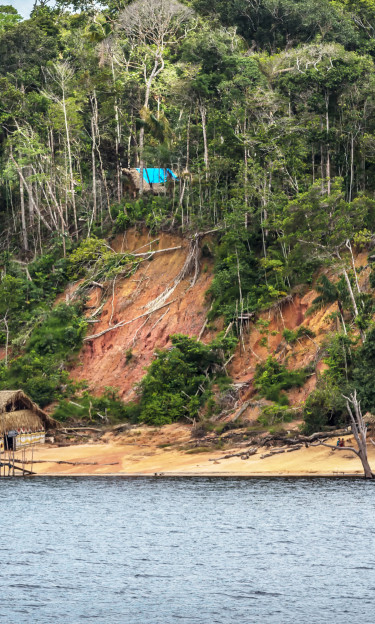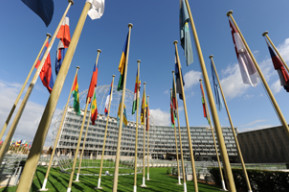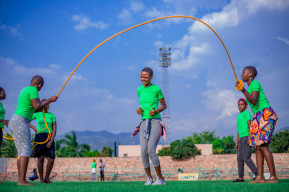Event
International Conference on Climate Risk, Vulnerability and Resilience Building
The Conference aims at bridging the gap between science, policy and decision-making to support effective resilience building.

According to the latest IPCC’s 6th Assessment Report (August 2021), “climate change is intensifying the water cycle”, which will bring more associated flooding and drought in many regions. In the face of the extreme flooding, drought and fire events that 2021 and 2022 brought so far, responsible for casualties and extensive material damage worldwide, it is becoming increasingly evident that climate uncertainty is hindering the task of developing adequate adaptation policies.
The Conference aims at bridging the gap between science, policy and decision-making to support effective resilience building. Its focus goes beyond vulnerability and climate risk assessments, addressing challenges in fast-tracking and scaling up innovative adaptation solutions, climate funding, and the emerging role of citizen participation and open science. This solution-oriented event will follow up on the discussions of the United Nations 2023 Water Conference, by linking scientists, practitioners and decision-makers to support the development of resilient water management policies.
Objectives and programme
The main objectives of the Conference are to:
- Introduce participants to the technical and practical impacts of climate change enhanced hydro-climatic hazards, with a special emphasis on droughts and floods, though a presentation of novel methodologies applied in worldwide case studies
- Highlight the critical role of citizen science and open science for effective adaptation to the impacts of those hazards
- Bridging the gap between the scientific community and decision-makers from different levels in climate-risk management issues
- Provide the necessary tools to leverage institutional capacity needed to support adaptation and resilience building
- Follow up on the discussions of the UN 2023 Water Conference, held in March, regarding hydro-climatic resilience
- Contribute to the implementation of the Strategic Plan of the 9th Phase of IHP and the UNESCO Recommendation on Open Science
The draft programme has been developed with the help of the Steering Committee. It aims to ensure that the Conference serves as a platform to expose the challenges, solutions and alternatives of the subject of the conference and allow a dialogue among stakeholders.
Tentative programme
The draft programme has been developed with the help of the Steering Committee. It aims to ensure that the Conference serves as a platform to expose the challenges, solutions and alternatives of the subject of the conference and allow a dialogue among stakeholders.
Book of abstracts of oral presentations
Book of abstracts of posters and poster session
Overview of the side events
You can take a look to the presentations of the Conference!
| Time | Session title | Room |
|---|---|---|
| 19 April 2023 | ||
| 09:00-09:45 | Opening session and Key messages form the UN Water Conference | Room XI |
| 09:45-11:00 | Science-Policy Discussion Panel: Bridging the gap between science and the different scales of decision making for climate risk management | Room XI |
| 11:00-11:30 | Break and Poster session | Room XI |
| 11:30-13:00 | Technical session 1: Monitoring the impacts of hydroclimatic risks and EWS – Part 1 | Room XI |
| Technical session 2: Adaptation strategies and NBS – Part 1 | Room IX | |
| Technical session 3: State of the Art: tools for flood monitoring – Part 1 | Room VIII | |
| 13:00-14:30 (Lunch break) | Side event 1: Managing Land and water to Build Ecosystem and Population Resilience to Climate Change | Room XI |
| Side Event 2: Resilience building in global mountains | Room IX | |
| Side Event 3: Cross-cutting Research on Hydrological Systems, Rivers, Climate Risk and Water-Food-Energy Nexus | Room VIII | |
| 14:30-16:00 | Technical Session 4: Adaptation strategies and NBS - Part 2 | Room XI |
| Technical Session 5: State of the Art: tools for flood monitoring – Part 2 | Room IX | |
| Technical Session 6: Monitoring the impacts of hydroclimatic risks and EWS – Part 2 | Room VIII | |
| 16:00-16:30 | Break and Poster session | Room X |
| 16:30-18:00 | Special Plenary Session: Global Water Science-Based Assessment from the UN 2023 Water Conference and Way Forward | Room XI |
| 18:00-19:30 | Conference Reception (offered by the Government of Flanders) | UNESCO Restaurant (7th floor) |
| 20 April 2023 | ||
| 09:00-09:30 | Opening of Day 2 and Keynote presentation | Room XI |
| 09:30-11:00 | Panel discussion: Next level of participatory water management: Citizen and open science and the role of indigenous and local knowledge systems | Room XI |
| 11:00-11:30 | Break and Poster session | Room XI |
| 11:30-13:00 | Technical session 1: Innovative participatory approaches, tools and methodologies supporting citizen science | Room XI |
| Technical session 2: Technical session 2: Participatory Approaches involving Indigenous and Local Knowledge | Room IX | |
| Technical session 3: Stakeholders engagement through new approaches — Part 1 | Room VIII | |
| 13:00-14:30 (Lunch break) | Side Event 1: Building Climate Resilience Through Meaningful Engagement and Positive Mental Health: Youth Perspectives From the Global North and South | Room XI |
| Side event 2: Integrating local and scientific knowledge in climate services: Challenges, opportunities & way forward | Room IX | |
| Side event 3: Tidal River Water Custodian': A serious game about livelihood inclusive decision making, aiming for integrated water management in the SouthWest Delta of Bangladesh | Room VIII | |
| 14:30-16:00 | Inception Meeting: Hydro-Resilience: Citizen and Open Science for Climate Adaptation | Room XI |
| Technical Session 4: Stakeholders engagement through new approaches — Part 2 | Room IX | |
| 16:00-16:20 | Break and Poster session | Room X |
| 16:20-16:45 | Summary of the Day 2 Technical Sessions and Closing Remarks | Room XI |
| 16:45-18:00 | Side event 4: Citizen Science Working Meeting | Room XI |
| Side event 5: Groundwater Monitoring and Open Data Platforms | Room IX (Fully virtual) | |
| 21 April 2023 | ||
| 09:00-09:30 | Opening of Day 3 and Keynote presentation | Room XI |
| 09:30-11:00 | Panel discussion: Water as a climate connector: The central role of water-energy-food nexus in cross-sectorial adaptation | Room XI |
| 11:00-11:30 | Break and Poster session | Room XI |
| 11:30-13:00 | Technical session 1: Assessing climate change impacts and adaptation through climate stress testing — Part 1 | Room XI |
| Technical session 2: WEF-nexus impacts of Climate Change: Challenges and solutions at national and regional scales — Part 1 | Room IX | |
| 13:00-14:30 (Lunch break) | Side Event 1: Round table - Streamlining CRIDA into Adaptation Processes | Room XI |
| Side event 2: Social vulnerability and climate risk: the stakes of resilience policies in Brazil | Room IX | |
| Side event 3: Building resilience by better assessing risks: gaps and opportunities to build capacities in water-food-energy nexus in the Global South | Room VIII (Fully virtual) | |
| 14:30-16:00 | Technical session 3: Assessing climate change impacts and adaptation through climate stress testing — Part 2 | Room XI |
| Science-Policy Discussion Panel: How to fast-track solutions and leverage funding mechanisms to support disaster risk reduction and adaptation? How to promote the inclusion of water in NDCs and NAPs? | Room IX | |
| Technical Session 4: WEF-nexus impacts of Climate Change: Challenges and solutions at national and regional scales — Part 2 | Room VIII | |
| 16:00-16:30 | Summary of the Day 3 Technical Sessions and Closing Remarks | Room XI |
Steering Committee
The members of the Conference's Steering Committee aim to provide expertise on the content and topics of interest related to the event. They also oversee the conception of the Conference, including the programme and selection of papers and posters.
Members
- Wouter Buytaert - Researcher, Imperial College of London
- Magali García Cárdenas - Researcher, Universidad Mayor de San Andrés
- Piet Kenabatho - Professor, University of Botswana
- Toshio Koike - Executive Director, International Centre for Water Hazard and Risk Management under the auspices of UNESCO
- William Logan - Director, International Center for Integrated Water Resources Management
- Gabriel Mancilla - Director, Centro del Agua para Zonas Áridas y Semiáridas de América Latina y el Caribe
- John Matthews - Executive Director, Alliance for Global Water Adaptation
- Anil Mishra - Chief of Section of Hydrological Systems, Climate change and Adaptation, Water Sciences Division, UNESCO
- Lars Ribbe - Professor, Institute for Innovation and Technology
- Mojtaba Shafiei - Researcher, East Water & Environmental Research Institute
- Justin Sheffield - Researcher, University of Southampton
- Ann Van Griensven - Professor, Vrije Universiteit Brussel
- Koen Verbist - Programme Specialist, Water Sciences Division, UNESCO
Background
This solution-oriented event will follow-up on the discussions held at the 2023 United Nations Water Conference.
The conference builds up upon the efforts of the project "Enhancing Climate Services for Improved Water Management" (CliMWaR), which aims to provide reliable climate services to monitor and forecast droughts and floods at the local level to improve national risk management strategies and to lower the impact of water-related hazards on vulnerable communities through improved communication and outreach in pilot regions of LAC and Africa, with particular attention to climate change vulnerabilities.
Past event:
International Expert Symposium "Drought Management. Creating a Community of Practice in Drought Management Tools" (2014)
19-21 November 2014, Santiago, Chile
Contacts
- Koen Verbist
k.verbist@unesco.org - Rita Marteleira
r.marteleira@unesco.org - Paulina M. Ramírez Quevedo
pm.ramirez-quevedo@unesco.org









